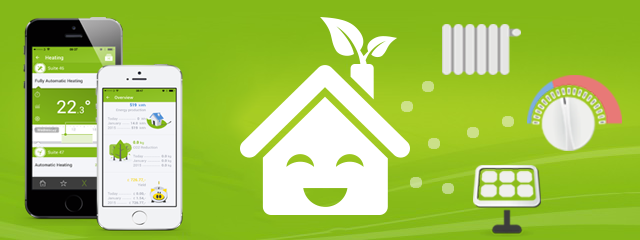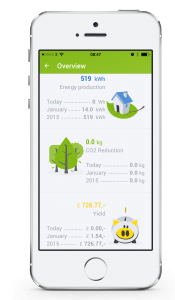
What Makes A Truly Smart Heating System?
A quick Google search will uncover a huge variety of ways to improve your current heating system – whether you’re building a new home, renovating your existing home, or just looking for ways to improve your home’s efficiency without a big DIY project. These range from high cost projects, such as installing solar panels, to simple suggestions for better insulating your home.
The term ‘smart heating‘ is increasingly being associated with off-the-shelf devices which allow you to control your heating remotely. Whilst this is a great option for the ‘technophobes’, it’s just the tip of the iceberg, so we’re going to delve a little deeper into the options for creating a truly smart heating system.
Remote Heating Control
 Whether you simply want to postpone the heating schedule if you’re working late, or ensure the house is warm when you return from your holiday, being able to control your heating remotely is an excellent way to cut down on heating your home unnecessarily.
Whether you simply want to postpone the heating schedule if you’re working late, or ensure the house is warm when you return from your holiday, being able to control your heating remotely is an excellent way to cut down on heating your home unnecessarily.
The easiest and most popular way to do this is via an app on your smartphone – simply open up the app to adjust the heating schedule or begin an override. A centralised smart home solution will also allow you to remotely put the house into ‘holiday mode’ to set the heating to frost protection, switch off all lights and appliances and arm the burglar alarm – perfect if you’re heading out for a weekend away straight from work.
Individual Room Control
 The problem with traditional heating systems (as well as some of the more basic remote heating control solutions) is that you get limited choices: turn the heating on or off for the house, and adjust the temperature up or down, as you would expect.
The problem with traditional heating systems (as well as some of the more basic remote heating control solutions) is that you get limited choices: turn the heating on or off for the house, and adjust the temperature up or down, as you would expect.
So, what’s the problem? Well, if your ‘smart thermostat’ can only manage the house as a whole, then when you wake up in the morning, not only are you heating your bedroom and bathroom, but also the lounge and dining room, both of which you’re unlikely to spend much time in before rushing out the door to work. In the evening, the roles are reversed – you spend money heating the upstairs of your home when you’re only using rooms downstairs, thus wasting heat and money.
Now, of course, you could argue that simply turning down the radiator valves in each of the rooms is a cheap and effective way around this, but doing that twice a day seems unnecessarily arduous. The solution? Install an intelligent zoned heating system, which allows you to control the temperature of each room individually and automatically, depending on how you use the rooms in your home throughout the day.
Self Learning Heating
 Intelligent zoned heating systems are also self-learning – your home knows how long it takes to heat up and adjusts accordingly; if there’s a sudden cold snap, your home will know to heat up earlier in order to reach the right temperature for when you reluctantly get out of bed.
Intelligent zoned heating systems are also self-learning – your home knows how long it takes to heat up and adjusts accordingly; if there’s a sudden cold snap, your home will know to heat up earlier in order to reach the right temperature for when you reluctantly get out of bed.
Statistics
 With the roll out of smart meters coming later this year, monitoring energy use is a hot topic. However, as we discussed in a previous blog about smart meters, they may not be as smart as we are led to believe. If you’re a fan of statistics and working out when, where and how you’re using your electricity, you’ll want to see how your usage compares with yesterday, last week, last month and even last year, and you’re not going to get that with a standard smart meter.
With the roll out of smart meters coming later this year, monitoring energy use is a hot topic. However, as we discussed in a previous blog about smart meters, they may not be as smart as we are led to believe. If you’re a fan of statistics and working out when, where and how you’re using your electricity, you’ll want to see how your usage compares with yesterday, last week, last month and even last year, and you’re not going to get that with a standard smart meter.
If you’re producing your own electricity through PV panels, you can easily check how much energy you are producing and how much you are consuming via a smart home app.
What Can I Install To Help Heat My Home More Efficiently?
Solar Water Heating
 If you are installing solar panels in your home, a great way of channelling the excess electricity produced throughout the day is to use it to heat your hot water. After all, it doesn’t seem very smart to sell the energy you have produced back to the grid during the day, and then pay nearly three times as much to buy it back again in the evening.
If you are installing solar panels in your home, a great way of channelling the excess electricity produced throughout the day is to use it to heat your hot water. After all, it doesn’t seem very smart to sell the energy you have produced back to the grid during the day, and then pay nearly three times as much to buy it back again in the evening.
Most immersion heaters use 3 kW of energy, so your PV panels would need to be producing at least this much energy before switching the immersion heater on, otherwise you’d pay. There is, however, a way to get around this – by “dimming” your immersion heater using an SSR (Solid State Relay). By doing this, you can control exactly how much of your ‘spare’ electricity goes to the immersion heater, meaning you only use what you have available.
Ground Source Heat Pump
 As the name suggests, ground source heat pumps use pipes which are buried in your garden to extract heat for your home. A mixture of water and antifreeze is circulated around a ground loop buried in the garden, absorbing heat from the ground and passing it through a heat exchanger into the heat pump. This heat can then be used for the hot water, radiators, and underfloor heating systems in the house.
As the name suggests, ground source heat pumps use pipes which are buried in your garden to extract heat for your home. A mixture of water and antifreeze is circulated around a ground loop buried in the garden, absorbing heat from the ground and passing it through a heat exchanger into the heat pump. This heat can then be used for the hot water, radiators, and underfloor heating systems in the house.
Since the ground stays at a fairly constant temperature under the surface, the heat pump can be used throughout the year to heat both your home and your hot water. This in turn can mean lower fuels bills, particularly if it replaces conventional electric heating.
They usually cost in the region of in the region of £11,000-£15,000 to install, and running costs will depend on a number of factors including the size of your home and how well insulated it is. Although domestic ground source heat pumps are generally allowed as permitted developments, it’s important to check with your local authority to find out whether you need planning permission or not.
Air Source Heat Pump
 Air source heat pumps absorb heat from the outside air into a fluid, which is passed through a compressor to increase its temperature, and then used for the heating and hot water in your house.
Air source heat pumps absorb heat from the outside air into a fluid, which is passed through a compressor to increase its temperature, and then used for the heating and hot water in your house.
There are two main types of air source heat pump systems: air-to-water systems distribute heat via the central heating system, whilst air-to-air heat pump systems produce warm air which is circulated by fans. The latter is unlikely to be used to for hot water.
Similarly to the ground source heat pump, air source heat pumps require a home that’s well insulated since they work best when producing heat at a lower temperature than traditional boilers. In terms of costs, the ground and air source heat pumps are similar, with installation costs for the latter being around £7,000 to £14,000.
Micro-CHP boiler
![]() Although the idea of a Micro-CHP boiler might sound a little futuristic, the concept behind them is really very simple: maximise efficiency. These boilers are very similar in size and shape to ordinary, domestic boilers, with the only difference being that they are able to generate electricity whilst they are heating water.
Although the idea of a Micro-CHP boiler might sound a little futuristic, the concept behind them is really very simple: maximise efficiency. These boilers are very similar in size and shape to ordinary, domestic boilers, with the only difference being that they are able to generate electricity whilst they are heating water.
Domestic micro-CHP systems are currently powered by mains gas or LPG, which are fossil fuels. Despite this, the technology is still considered to be a ‘low carbon technology’ because it can be more efficient than burning fossil fuels for heat and getting electricity from the grid.
The Renewable Heat Incentive
 The Government’s Renewable Heat Incentive was launched last year for domestic homes, and could be a way to make some money from the heating systems that you install in your home. The incentive is mainly targeted towards homes that do not have mains gas, since these homes have the most potential to save on fuel bills and decrease carbon emissions.
The Government’s Renewable Heat Incentive was launched last year for domestic homes, and could be a way to make some money from the heating systems that you install in your home. The incentive is mainly targeted towards homes that do not have mains gas, since these homes have the most potential to save on fuel bills and decrease carbon emissions.
Both ground and air source heat pumps are eligible for the Renewable Heat Incentive (as well as the Green Deal) but payments for air source heat pumps can be less than half of those available to those with ground source heat pumps at £1,280 and £3690, respectively. Again, it’s important to consider the bigger picture and focus on creating a well insulated home in order to reap the biggest benefits from this scheme.
So, what makes a truly smart heating system?
 A truly smart heating system needs to think for itself, be sustainable and efficient both in terms of energy and money, and be easy to use and control.
A truly smart heating system needs to think for itself, be sustainable and efficient both in terms of energy and money, and be easy to use and control.
Whilst there are a variety of choices in terms of how you source the heat, it’s important to be able to see how efficiently you’re using that heat, so that you can optimise the way in which you use the resources available to you.

